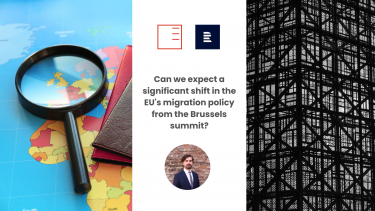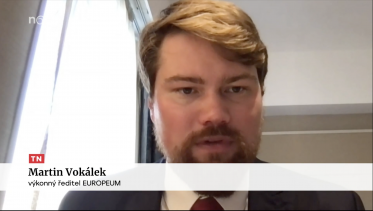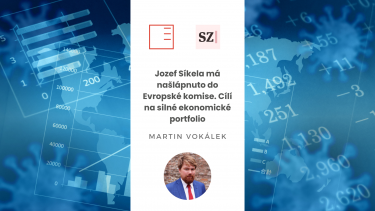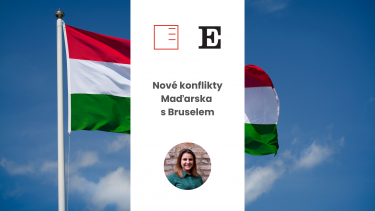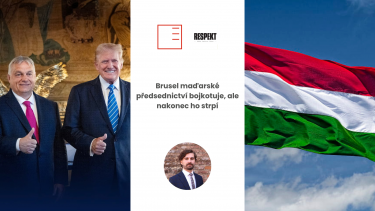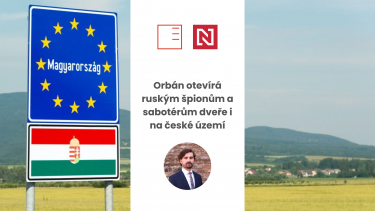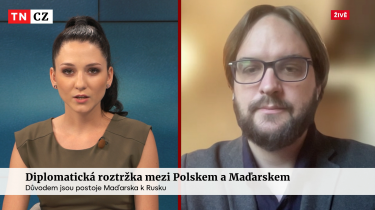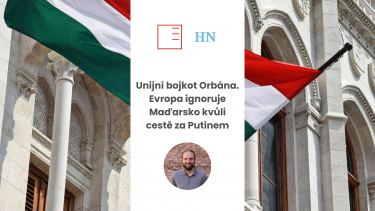ČRo Radiožurnál | Can we expect a significant shift in the EU's migration policy from the Brussels summit?
The EU Summit started in Brussels this morning and one of its key points is to be further assistance for Ukraine. President Volodymyr Zelensky is in attendance and has presented a "victory plan" which includes strengthening Ukraine's military capabilities. A particularly heated discussion is expected around adjustments to EU migration and asylum policy. Shortly before the start of the summit, representatives of several countries, including the Czech Republic, were due to hold an emergency meeting to reconcile their positions in this area. Viktor Daněk, deputy director of EUROPEUM Institute, commented on the current events on Czech Radio broadcast.
Show moreTelevizní noviny | Outgoing European Commission sues Hungary
The European Commission sues Hungary over a law protecting national sovereignty. According to Brussels, it violates, among other things, several fundamental freedoms of the internal market or EU data protection laws. Budapest defends the law on the grounds that it is necessary to protect it from foreign political interference. For example, it prohibits political parties standing for election from being financed by anyone from abroad. Martin Vokálek, Executive Director of EUROPEUM Institute, commented for main evening broadcast on TV Nova.
Show more
Seznam Zprávy | Jozef Síkela is set for the European Commission, aiming for a strong economic portfolio
It has now been confirmed by the government that minister Jozef Síkela is headed to the European Commission as the Czech candidate. Although President Ursula von der Leyen called on member states to nominate a pair of candidates, both men and women, the Czech Republic did not comply with this request. The outcome is expected to be decided in September when the portfolios for all new EU commissioners will be announced. Martin Vokálek, Executive Director of EUROPEUM Institute, commented for Seznam Zprávy.
Show more
El País | Hungary's new conflicts with Brussels as Budapest takes over the rotating presidency of the EU Council
This year, the EU has not declared the regime in Belarus authoritarian. Hungary vetoed such a decision. Budapest has thus found a new element in this short EU tradition - a communiqué on the anniversary of the electoral fraud committed by Alexander Lukashenko in 2020 - to clash with Brussels. Kristína Chebáková, project manager at EUROPEUM Institute, commented on the situation related to the Hungarian EU presidency for the Spanish daily El País.
Show moreRespekt | Brussels Boycotts Hungarian Presidency but Will Ultimately Tolerate It
Brussels is boycotting Hungary's presidency due to Viktor Orbán, who during his tour of Kyiv, Moscow, and Beijing claimed to be working for peace, even as his actions coincided with Russia's attack on a children's hospital in Kyiv. His mission was sharply criticized by European leaders, and the EU has distanced itself from his actions, with member states agreeing to boycott informal meetings in Hungary. Could Brussels take further measures? Viktor Daněk, Deputy Director of EUROPEUM Institute, comments for Respekt magazine.
Show moreDeník N | Orbán Opens Doors to Russian Spies and Saboteurs in Czech Territory
Viktor Orbán has recently stirred controversy in the EU by allowing Russian and Belarusian citizens to enter Hungary without controls. This move, which simplifies their movement within the Schengen Area, has raised concerns about security threats and pressure on European states. What impact might Orbán's policy have on Europe's security, and how are EU institutions responding? Viktor Daněk, Deputy Director of EUROPEUM Institute, discusses the situation for Deník N.
Show moreTN.cz | Rift between Hungary and Poland. Reason being Orbán's relationship with Putin
A diplomatic rift has erupted between Budapest and Warsaw over the different attitudes of the two countries towards Russia. First, Hungarian Prime Minister Viktor Orbán branded Poland as the country with the most hypocritical policy in Europe, while the Poles hit back by pointing out the close relations Orbán maintains with Russian President Putin. The media are also talking about the possible end of the V4 group. EUROPEUM Institute researcher Vít Havelka spoke more about the dispute in an interview with TN.cz.
Show more
Hospodářské noviny | EU boycott of Orbán. Europe ignores Hungary for a trip to see Putin
Hungary may hold the EU presidency until the end of the year, but member state politicians plan to ignore meetings the country holds. This is in response to Hungarian Prime Minister Viktor Orbán's secret visit to Russian President Vladimir Putin, as well as an unscheduled call for a ceasefire issued to Ukrainian President Volodymyr Zelensky. Vít Havelka, a research fellow at EUROPEUM Institute, commented on the boycott for Hospodářské noviny.
Show more
e15 | European politicians boycott Hungarian presidency. Will Orbán continue to provoke?
Hungarian Prime Minister Viktor Orbán took over the EU Council presidency less than a month ago, but he has already managed to provoke the EU institutions and most member states with his unauthorized "peace" mission to Russia and China. During this mission, he presented himself as a representative of the European Union, despite having no authority to do so. European politicians have responded to this situation with initial retaliatory measures. How will Viktor Orbán proceed? What strategies and tactics might the Hungarian Prime Minister use during his presidency? Oszkár Roginer-Hofmeister, a research fellow at EUROPEUM Institute, commented on this for e15.
Show more
ČRo Plus | Slovakia and Hungary face oil supply issues and file a complaint against Ukraine with the European Commission
Russian oil from Lukoil still isn’t flowing through Ukraine to Slovakia and Hungary. In June, Ukraine unilaterally decided to ban the transit of Lukoil oil through its territory, as the company was added to its sanctions list. Slovakia and Hungary have turned to the European Commission for help in resolving the issue. What can the EU do about this situation? What role does the Association Agreement with Ukraine play in resolving this dispute? Viktor Daněk, Deputy Director of EUROPEUM Institute, comments on the situation.
Show moreStaroměstské náměstí 4/1
Prague 1 - Staré Město
110 00
tel.: +420 212 246 552
email: europeum@europeum.org
https://www.europeum.org
